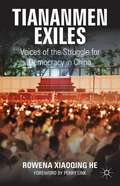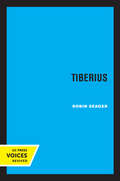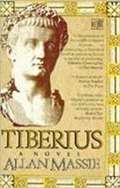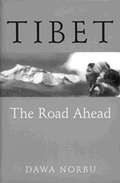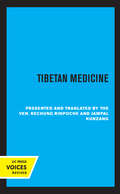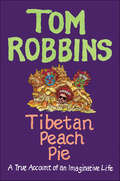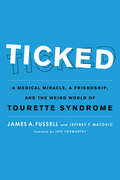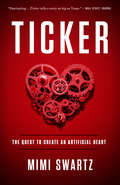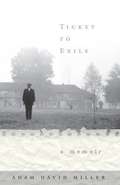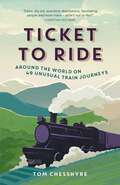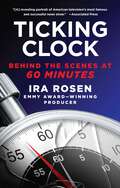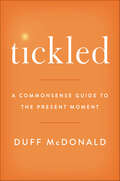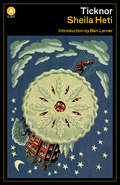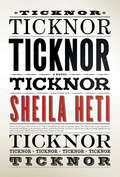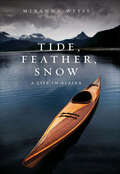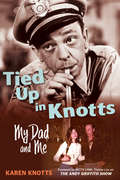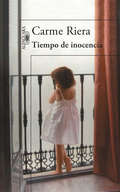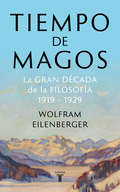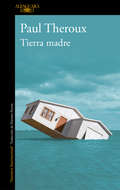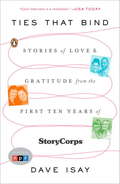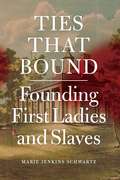- Table View
- List View
Tiananmen Exiles
by Rowena Xiaoqing HeIn the spring of 1989, millions of citizens across China took to the streets in a nationwide uprising against government corruption and authoritarian rule. What began with widespread hope for political reform ended with the People's Liberation Army firing on unarmed citizens in the capital city of Beijing, and those leaders who survived the crackdown became wanted criminals overnight. Among the witnesses to this unprecedented popular movement was Rowena Xiaoqing He, who would later join former student leaders and other exiles in North America, where she has worked tirelessly for over a decade to keep the memory of the Tiananmen Movement alive. This moving oral history interweaves He's own experiences with the accounts of three student leaders exiled from China. Here, in their own words, they describe their childhoods during Mao's Cultural Revolution, their political activism, the bitter disappointments of 1989, and the profound contradictions and challenges they face as exiles. Variously labeled as heroes, victims, and traitors in the years after Tiananmen, these individuals tell difficult stories of thwarted ideals and disconnection, but that nonetheless embody the hope for a freer China and a more just world.
Tiberius (Blackwell Ancient Lives Ser.)
by Robin SeagerThis title is part of UC Press's Voices Revived program, which commemorates University of California Press’s mission to seek out and cultivate the brightest minds and give them voice, reach, and impact. Drawing on a backlist dating to 1893, Voices Revived makes high-quality, peer-reviewed scholarship accessible once again using print-on-demand technology. This title was originally published in 1972.
Tiberius and His Age: Myth, Sex, Luxury, and Power
by Edward ChamplinA radical new portrait of the infamous Roman emperorRome&’s second emperor, Tiberius (42 BCE–CE 37), has traditionally been seen as a villainous hypocrite—treacherous, grasping, vindictive, and depraved. But in Tiberius and His Age, Edward Champlin draws on vast and diverse evidence to show that Tiberius was—and was seen by contemporaries to be—recognizably human and far more complex than the monster of the hostile tradition that began with Tacitus and Suetonius.Focusing on the overlapping themes of luxury, sex, power, and, especially, myth, Tiberius and His Age examines Tiberius&’s standing as a folkloric figure in the Roman popular imagination and his conscious use of mythological themes to consolidate his power. It argues that the striking stories of Tiberius&’s sexual depravity, which literary sources passed on to later generations, are ultimately incoherent fictions, the work of a brilliant fantasist who hated the emperor. The book&’s portraits of three important figures in Tiberius&’s circle—the gourmands Asellius Sabinus and Marcus Apicius and the emperor&’s lieutenant, Sejanus—provide new perspectives on the emperor and his age. Tiberius&’s passions for astrology, gastronomy, and mythology, which have often been seen as eccentric scholarly diversions, are revealed instead to be central to contemporary Roman debates and keys to understanding his personality, his power, and the lasting image of Roman emperors.Incisive, witty, and original, Tiberius and His Age presents a startlingly new picture of Tiberius and the culture and politics of the early Roman Empire.
Tiberius: The Memoirs of the Emperor
by Allan Massie"Roman history provides all the political and sexual excesses of a blockbuster plot. When it is well written and vividly characterized as it is here, it is fascinating stuff." - Miranda Miller in The Guardian Historical fiction about the Roman Emperor.
Tibet: The Road Ahead
by Dawa NorbuTibet: The Road Ahead is the extraordinary account of the potential extinction of a civilisation. Written by a gifted Tibetan of humble origins, this book tells the story of ordinary Tibetans in the twentieth century.Professor Norbu refutes China's claim that Tibet has been part of China since the seventh century AD, showing how the relationship between the two countries was symbolic and ceremonial, rather than one of political suppression. He portrays pre-1950 Tibet as a place of complete and genuine freedom, in stark contrast with recent events in the region.Beautifully written and offering a fresh, incisive look at the road ahead for Tibet in post-Deng China, this book will appeal to all those fascinated by, and concerned for 'the land of the snows'.
Tibetan Medicine
by Rechung Rinpoche Jampal KunzangThis title is part of UC Press's Voices Revived program, which commemorates University of California Press’s mission to seek out and cultivate the brightest minds and give them voice, reach, and impact. Drawing on a backlist dating to 1893, Voices Revived makes high-quality, peer-reviewed scholarship accessible once again using print-on-demand technology. This title was originally published in 1976.
Tibetan Peach Pie: A True Account of an Imaginative Life
by Tom RobbinsInternationally bestselling novelist and American icon Tom Robbins’ legendary memoir—wild tales of his life and times, both at home and around the globe.Tom Robbins’ warm, wise, and wonderfully weird novels—including Still Life with Woodpecker, Jitterbug Perfume, and Fierce Invalids Home from Hot Climates—provide an entryway into the frontier of his singular imagination. Madcap but sincere, pulsating with strong social and philosophical undercurrents, his irreverent classics have introduced countless readers to natural born hitchhiking cowgirls, born-again monkeys, a philosophizing can of beans, exiled royalty, and problematic redheads.In Tibetan Peach Pie, Robbins turns that unparalleled literary sensibility inward, stitching together stories of his unconventional life, from his Appalachian childhood to his globetrotting adventures —told in his unique voice that combines the sweet and sly, the spiritual and earthy. The grandchild of Baptist preachers, Robbins would become over the course of half a century a poet-interruptus, an air force weatherman, a radio DJ, an art-critic-turned-psychedelic-journeyman, a world-famous novelist, and a counter-culture hero, leading a life as unlikely, magical, and bizarre as those of his quixotic characters.Robbins offers intimate snapshots of Appalachia during the Great Depression, the West Coast during the Sixties psychedelic revolution, international roving before homeland security monitored our travels, and New York publishing when it still relied on trees. Written with the big-hearted comedy and mesmerizing linguistic invention for which he is known, Tibetan Peach Pie is an invitation into the private world of a literary legend.“A rollicking reminiscence of his Appalachian upbringing, his spiral through the psychedelic ’60s, and his unconventional path to literary stardom.” —O, The Oprah Magazine
Ticked: A Medical Miracle, a Friendship, and the Weird World of Tourette Syndrome
by Jeff Foxworthy James Fussell Jeffrey MatovicAn inspirational tale of personal struggle with and triumph over Tourette syndrome, this is the story of Jeff Matovic and the radical treatment he sought to cure himself. After suffering from Tourette's for years--with his tics and outbursts getting progressively worse and with no results coming from drugs or physical or spiritual therapy--Jeff was able to convince his doctors and his insurance company to try a risky deep brain stimulation treatment, a surgery that involves the implantation of a pacemaker for the brain into his skull. Penned by a journalist who is also afflicted with Tourette's, this is the incredible story of a friendship that blossomed under their common experiences with this bizarre brain disorder. A complete discussion of the latest medical research of and treatments for Tourette's, written in accessible and easy-to-understand terminology, is also included.
Ticker: The Quest to Create an Artificial Heart
by Mimi SwartzIt wasn’t supposed to be this hard. If America could send a man to the moon, shouldn’t the best surgeons in the world be able to build an artificial heart? In Ticker, Texas Monthly executive editor and two time National Magazine Award winner Mimi Swartz shows just how complex and difficult it can be to replicate one of nature’s greatest creations. Part investigative journalism, part medical mystery, Ticker is a dazzling story of modern innovation, recounting fifty years of false starts, abysmal failures and miraculous triumphs, as experienced by one the world’s foremost heart surgeons, O.H. “Bud” Frazier, who has given his life to saving the un-savable. His journey takes him from a small town in west Texas to one of the country’s most prestigious medical institutions, The Texas Heart Institute, from the halls of Congress to the animal laboratories where calves are fitted with new heart designs. The roadblocks to success —medical setbacks, technological shortcomings, government regulations – are immense. Still, Bud and his associates persist, finding inspiration in the unlikeliest of places. A field beside the Nile irrigated by an Archimedes screw. A hardware store in Brisbane, Australia. A seedy bar on the wrong side of Houston. Until post WWII, heart surgery did not exist. Ticker provides a riveting history of the pioneers who gave their all to the courageous process of cutting into the only organ humans cannot live without. Heart surgeons Michael DeBakey and Denton Cooley, whose feud dominated the dramatic beginnings of heart surgery. Christian Barnaard, who changed the world overnight by performing the first heart transplant. Inventor Robert Jarvik, whose artificial heart made patient Barney Clark a worldwide symbol of both the brilliant promise of technology and the devastating evils of experimentation run amuck. Rich in supporting players, Ticker introduces us to Bud’s brilliant colleagues in his quixotic quest to develop an artificial heart: Billy Cohn, the heart surgeon and inventor who devotes his spare time to the pursuit of magic and music; Daniel Timms, the Brisbane biomedical engineer whose design of a lightweight, pulseless heart with but a single moving part offers a new way forward. And, as government money dries up, the unlikeliest of backers, Houston’s furniture king, Mattress Mack. In a sweeping narrative of one man’s obsession, Swartz raises some of the hardest questions of the human condition. What are the tradeoffs of medical progress? What is the cost, in suffering and resources, of offering patients a few more months, or years of life? Must science do harm to do good? Ticker takes us on an unforgettable journey into the power and mystery of the human heart.
Ticket to Exile: A Memoir
by Adam David MillerAt age nineteen, A.D. Miller sat in a jail cell. His crime? He passed a white girl a note that read, ''I would like to get to know you better.'' For this he was accused of attempted rape. Ticket to Exile recounts Miller's coming-of-age in Depression-era Orangeburg, South Carolina. Miller reconstructs the sights, sounds and social complexities of the pre-civil rights South, and his youth as a closet rebel who successfully evaded the worst strictures of a racially segregated small town. By the time he is forced into exile, we realize that this fate was inevitable for a young man too intelligent and aware of the limitations of his society to remain there without disastrous consequences.
Ticket to Ride: Around the World on 49 Unusual Train Journeys
by Tom ChesshyreTom Chesshyre has made it his mission to experience the world through train travel – on both epic and everyday rail routes, aboard every type of train, from colonial steam locomotives to high-tech bullet trains. Join him on a whistle-stop tour of some of the most exhilarating journeys around the globe, from Sri Lanka to Tehran and beyond.
Ticket to Ride: Around the World on 49 Unusual Train Journeys
by Tom ChesshyreTom Chesshyre has made it his mission to experience the world through train travel – on both epic and everyday rail routes, aboard every type of train, from colonial steam locomotives to high-tech bullet trains. Join him on a whistle-stop tour of some of the most exhilarating journeys around the globe, from Sri Lanka to Tehran and beyond.
Ticking Clock: Behind the Scenes at 60 Minutes
by Ira RosenTwo-time Peabody Award-winning writer and producer Ira Rosen reveals the intimate, untold stories of his decades at America’s most iconic news show. It’s a 60 Minutes story on 60 Minutes itself. When producer Ira Rosen walked into the 60 Minutes offices in June 1980, he knew he was about to enter television history. His career catapulted him to the heights of TV journalism, breaking some of the most important stories in TV news. But behind the scenes was a war room of clashing producers, anchors, and the most formidable 60 Minutes figure: legendary correspondent Mike Wallace.Based on decades of access and experience, Ira Rosen takes readers behind closed doors to offer an incisive look at the show that invented TV investigative journalism. With surprising humor, charm, and an eye for colorful detail, Rosen delivers an authoritative account of the unforgettable personalities that battled for prestige, credit, and the desire to scoop everyone else in the game. As Mike Wallace’s top producer, Rosen reveals the interview secrets that made Wallace’s work legendary, and the flaring temper that made him infamous. Later, as senior producer of ABC News Primetime Live and 20/20, Rosen exposes the competitive environment among famous colleagues like Diane Sawyer and Barbara Walters, and the power plays between correspondents Chris Wallace, Anderson Cooper, and Chris Cuomo. A master class in how TV news is made, Rosen shows readers how 60 Minutes puts together a story when sources are explosive, unreliable, and even dangerous. From unearthing shocking revelations from inside the Trump White House, to an outrageous proposition from Ghislaine Maxwell, to interviewing gangsters Joe Bonanno and John Gotti Jr., Ira Rosen was behind the scenes of 60 Minutes' most sensational stories.Highly entertaining, dishy, and unforgettable, Ticking Clock is a never-before-told account of the most successful news show in American history.
Tickled: A Commonsense Guide to the Present Moment
by Duff McDonaldA New York Times bestselling journalist sets out to explore our addiction to the quantification of everything and ends up confronting his own addiction to certainty. In the quiet of quarantine, he decides to choose ease, rather than control—pursuing habits and hobbies that bring joy and “tickles” to each and every moment—and finds peace of mind, renewed creativity, and deepened relationships are the reward.In 2020, nothing went according to plan. Duff McDonald had intended to write a book about society’s obsession with measurements, data, and predictions, showing how it blunts individual happiness and decision-making while fueling corporate capitalism. But in the quiet of quarantine, McDonald found himself reexamining the assumptions beneath his own life choices. He also reconsidered his book, deciding instead to reframe his approach as an exploration of his own battle with what he calls the “precision paradox”—the existential struggle between our desire for ease and our need to exert control.Drawing inspiration from an impressive range of sources—from Borges to the Buddha to Bob (Dylan) to Harry Potter—McDonald documents how he let go of his attachment to precision in favor of delving deeper into what it means to be present—in his work, his relationships, and what he calls the “science of experience.” He asks, “What should I have been doing? I should have been focusing on things that I love, not the things that anger or annoy me. I should have been focusing on things that tickle me.” Part self-help, part memoir, Tickled is a story of how to bring joy and love into your life right now. McDonald acknowledges that “tickle” is a funny, awkward word. In one context, it’s as innocent as can be. But it also runs deeper. When something tickles you, you are in the moment, experiencing reality itself—at the vortex of truth, consciousness, and bliss. “When something tickles, that’s your soul speaking to you in the language of love, thanking you for experience,” he says. As he lays out his own personal transformation, McDonald invites readers to begin their own journeys to find out what “tickles” them, too.This exploration of joy and presence—experiences that tickle—lies at the heart of McDonald’s unusual, moving, and profound book.
Ticknor (A List)
by Sheila HetiThe A List edition of Ticknor, the first novel by Sheila Heti — featuring a new introduction by Ben Lerner, author of Leaving the Atocha Station.George Ticknor is trying to reconcile his own failure with the success of his boyhood friend, the famous American historian William Prescott. Ticknor's life has been reduced to a series of awkward meetings, failed dinner parties, and other misfortunes he is loath to own up to. Situated in the complicated and contradictory moments that make friendships both tenuous and difficult to relinquish, Ticknor's fixated thoughts about his and Prescott's dissimilar fates lead him through a litany of rationalizations and recriminations, a psychological maze that is paranoid and harrowing as well as ludicrous and absurd.In George Ticknor, Sheila Heti has created a memorable new hero of Prufrockian dimension. Ticknor is an exquisite singularity.
Ticknor: A Novel
by Sheila HetiTicknor is the first novel by Sheila Heti, the author of the acclaimed story collection The Middle Stories and, with Misha Glouberman, the essay collection The Chairs are Where the People Go. George Ticknor is trying to reconcile his own failure with the success of his boyhood friend, the famous American historian William Prescott. Ticknor's life has been reduced to a series of awkward meetings, failed dinner parties, and other misfortunes he is loath to own up to. Situated in the complicated and contradictory moments that make friendships both tenuous and difficult to relinquish, Ticknor's fixated thoughts about his and Prescott's dissimilar fates lead him through a litany of rationalizations and recriminations, a psychological maze that is paranoid and harrowing as well as ludicrous and absurd. In George Ticknor, Sheila Heti has created a memorable new hero of Prufrockian dimension. Ticknor is an exquisite singularity.
Tide, Feather, Snow: A Life in Alaska
by Miranda Weiss"Tide, Feather, Snow is about the resplendence and subtleties of coastal Alaska, and about one woman’s attempt to be fully present in them. Weiss serves as a skilled and poetic witness to a place undergoing incessant change." — Anthony Doerr, author of The Shell CollectorA memoir of moving to Alaska—and staying—by a writer whose gift for writing about place and natural beauty is reminiscent of John McPhee and Jonathan Raban.An extreme landscape in both its beauty and challenges, Alaska is a place where know-how is currency and a novice's mistakes can be fatal. But it is a place for glorious reinvention—a refuge for those desperate to escape . . . and for those looking for something more.Miranda Weiss, a young woman who grew up landlocked in a well-kept East Coast suburb, moved to Homer, Alaska, with her boyfriend, determined to make a place for herself in this unfamiliar country where the years are marked by seasons of fish, and where locals carry around the knowledge of tides, boats, and weather as ballast. In Tide, Feather, Snow, Weiss introduces readers to the memorable people and peculiar beauty of Alaska's vast landscape, as she takes us along on her remarkable personal journey of adventure, physical challenge, and culture clash.
Tied Up in Knotts: My Dad and Me
by Karen Knotts Betty LynnKaren Knotts tells the full story of her father, Don Knotts Much has been written about Don Knotts's career, especially about his iconic role as Barney Fife on The Andy Griffith Show, but personal views into the man himself are few and far between. In Tied Up in Knotts, a loving daughter provides a full-life narrative of her father: Don's difficult childhood in an abusive home, his escape into comedic performance, becoming a household name, his growth as a feature film actor, his failing health, and his family life throughout, leading to touching and hilarious moments that will make the reader laugh and cry. Those looking for a behind-the-scenes peek at the show, from the nuts and bolts of production to the hilarious pranks and heartfelt moments between the cast and crew, will see it all through the eyes of the little girl who grew up on the set. Knotts will delight readers with the memories of celebrities touched by Don's life, including Ron Howard, Tim Conway, Andy Griffith, Maggie Peterson, John Waters, Barbara Eden, and Jim Carrey.Tied Up In Knotts delves beyond Barney Fife nostalgia to tell the life story of a man and father.
Tiempo de inocencia
by Carme RieraPREMIO NACIONAL DE LAS LETRAS 2015 Un libro que retrata la infancia de la autora y la Mallorca de los años cincuenta. «Para bien o para mal, hay muy pocas cosas de mi vida que no tengan su punto de partida en la infancia.» La protagonista de esta historia es una niña que odia los espejos porque no es guapa como su madre. Se parece tanto a su padre que cree que en cualquier momento también le saldrá bigote. Lo que más le gusta es escuchar detrás de las puertas y mirar por el balcón a los niños que juegan en la calle, a la que no le permiten bajar. La abuela le cuenta historias que desbordan su imaginación y la impulsan a otras fabulaciones. Algunas tienen que ver con los horrores del infierno e incluso con la posibilidad de que le salga una joroba a causa de sus pecados. «La Mallorca que muestran estas páginas se parece poco a la actual. Los cambios acaecidos a partir de los años sesenta, con la llegada masiva de turistas, modificaron la fisonomía de la isla. Donde había algarrobos, olivos, almendros o pinos se sembraron hoteles, bloques de apartamentos, tiendas de souvenirs. Crecieron desvaríos de cemento armado. (...) Dejar constancia escrita de aquella época me ha permitido, en gran manera, recuperarla.» Además de recrear su universo infantil, Carme Riera nos permite asomarnos a una determinada época en la que el verbo prohibir era el más usual. A través de la mirada de una niña vemos desfilar una serie de personajes ligados a tradiciones y oficios hoy desaparecidos. Tiempo de inocencia es un recorrido íntimo trenzado por recuerdos de infancia, que, como cerezas, van enlazándose para conformar también el retrato de una peculiar familia mallorquina y su entorno en los años cincuenta del siglo XX, en pleno franquismo. Reseña: «Memorias de niñez escritas con esa maravillosa elegancia y esa madurez expresiva que son el sello distintivo de la autora. Un libro con amor y humor, envuelto en un punzante aroma de nostalgia».Rosa Montero, El País
Tiempo de magos: La gran década de la filosofía: 1919-1929
by Wolfram EilenbergerLa historia de cómo cuatro genios revolucionaron la filosofía y cambiaron nuestra forma de entender el mundo. «Un libro que no tendrá parangón en mucho tiempo. Engancha como un thriller y ayuda más a la comprensión de nuestro presente que ningún estudio sociológico.» <P><P>Micha Brumlik, Die Tageszeitung Estamos en 1919. La guerra acaba de terminar. «El doctor Benjamin huye de su padre, el subteniente Wittgenstein comete un suicidio económico, el profesor auxiliar Heidegger abandona la fe y monsieur Cassirer trabaja en el tranvía para inspirarse.» Comienza una década de creatividad excepcional que cambiará para siempre el rumbo de las ideas en Europa. <P><P>Los años veinte del siglo XX en Alemania dieron forma a nuestro pensamiento contemporáneo, y son el verdadero origen de nuestra moderna relación con el mundo. Entenderlos significa, de alguna manera, entendernos. Ludwig Wittgenstein, Walter Benjamin, Ernst Cassirer y Martin Heidegger, cuatro gigantes de todos los tiempos, lideraron esta revolución y elevaron el alemán a lengua del espíritu. <P><P>Fue en una Alemania dividida entre las ganas de vivir y el abismo de la crisis económica, entre la lujuria de las noches berlinesas, las conspiraciones de la República de Weimar y la amenaza del nacionalsocialismo, donde encontraron su voz y su estilo. En Tiempo de magos, la vida cotidiana y los dilemas metafísicos son parte de la misma historia. <P><P>Con un espléndido estilo narrativo, Eilenberger traza conexiones entre los modos de vida y las teorías de estos cuatro filósofos seductores y brillantes, guiados por la necesidad de responder a las preguntas clave de la historia del pensamiento. Sus respuestas iluminan también los peligrosos tiempos que vivimos hoy.
Tiempo de magos: La gran década de la filosofía: 1919-1929
by Wolfram EilenbergerLa historia de cómo cuatro genios revolucionaron la filosofía y cambiaron nuestra forma de entender el mundo. «Un libro que no tendrá parangón en mucho tiempo. Engancha como un thriller y ayuda más a la comprensión de nuestro presente que ningún estudio sociológico.»Micha Brumlik, Die Tageszeitung Estamos en 1919. La guerra acaba de terminar. «El doctor Benjamin huye de su padre, el subteniente Wittgenstein comete un suicidio económico, el profesor auxiliar Heidegger abandona la fe y monsieur Cassirer trabaja en el tranvía para inspirarse.» Comienza una década de creatividad excepcional que cambiará para siempre el rumbo de las ideas en Europa. Los años veinte del siglo XX en Alemania dieron forma a nuestro pensamiento contemporáneo, y son el verdadero origen de nuestra moderna relación con el mundo. Entenderlos significa, de alguna manera, entendernos. Ludwig Wittgenstein, Walter Benjamin, Ernst Cassirer y Martin Heidegger, cuatro gigantes de todos los tiempos, lideraron esta revolución y elevaron el alemán a lengua del espíritu. Fue en una Alemania dividida entre las ganas de vivir y el abismo de la crisis económica, entre la lujuria de las noches berlinesas, las conspiraciones de la República de Weimar y la amenaza del nacionalsocialismo, donde encontraron su voz y su estilo. En Tiempo de magos, la vida cotidiana y los dilemas metafísicos son parte de la misma historia. Con un espléndido estilo narrativo, Eilenberger traza conexiones entre los modos de vida y las teorías de estos cuatro filósofos seductores y brillantes, guiados por la necesidad de responder a las preguntas clave de la historia del pensamiento. Sus respuestas iluminan también los peligrosos tiempos que vivimos hoy. ** Finalista al mejor libro de ensayo 2019 concedido por la Asociación de Librerías de Madrid La crítica ha dicho:«Cuando el suelo tiembla bajo nuestros pies nos da por recordar. Sobre todo, qué hicimos la última vez que sucedió. Por eso se lee tan bien Tiempo de magos.»Darío Prieto, El Mundo (La esfera de papel) «De Cambridge a Davos, de Berlín a París, Tiempo de magos ofrece una narrativa novedosa, extremadamente tangible, de una época que dio forma a nuestro pensamiento como ninguna otra.»Hans Ulrich Gumbrecht «Aún quedan algunos libros que nos devuelven por unos días la fascinación de antaño. Este es uno de ellos. Si solo te queda dinero para un libro de filosofía, elige este.»Wolfgang Pichler, General-Anzeiger «Bellamente narrado. Una asombrosa constelación espiritual, cuatro estilos de vida y cuatro respuestas a la pregunta "¿Qué es el hombre?" en un gran momento de la filosofía.»Rüdiger Safranski «Un desafío, accesible y estimulante, a la historia académica de la filosofía. Vale mucho la pena leerlo.»Thomas Meyer, Der Tagesspiegel «Con erudición, detalles, suspense y buen pulso, Eilenberger relata la década en la que se decidía el destino de Europa, cuando la historia universal contenía la respiración.»Roman Leick, Der Spiegel «Wolfram Eilenberger nos cuenta la historia de la filosofía alemana al estilo de un cronista deportivo.»Lorenz Jäger, Frankfurter Allgemeine Zeitung «Wolfram Eilenberger plantea grandes lecciones sin resultar aleccionador. Conserva el asombro de la filosofía pero descarta la reverencia por lo ininteligible. No toma partido, sino que permite que los diferentes enfoques coexistan. Da ganas de leer y leer a cada uno de los cuatro filósofos retratados.»Jörg Magenau, Süddeutsche Zeitung «La lectura de este libro es una experiencia absolutamente asombrosa. La investigación de Eilenberger sobre esta década olvidada es, ante todo, un libro para nuestro tiempo.»Thorsten Jantschek, Philosophie Magazin
Tierra madre
by Paul TherouxLa esperada gran novela de Paul Theroux, fruto de años de reflexión literaria y afectiva. El retrato de una madre única que también se parece a todas. «Uno viene de una familia como de una tierra lejana. La nuestra era un caso aparte, con sus propias costumbres y crueldades.» Para los habitantes de Cape Cod, madre es un ejemplo de piedad, austeridad y trabajo duro. Para su marido y sus siete hijos, es egoísta, a veces mezquina, siempre tirana y disfruta enfrentándolos entre sí. Angela, su favorita que murió en el parto, es la única capaz de entenderla, según dice a los demás. Entre estos se incluyen Fred, un abogado de oficio; Floyd, un divertido profesor; un par de inseparables hermanas cuya devoción por la figura materna ha consumido sus vidas, y JP, el narrador, un escritor de éxito cuyo trabajo menosprecia. Tierra madre es un punzante retrato del impacto que el narcisismo materno puede tener en una familia, un cautivador, doloroso y a menudo divertido relato sobre una gran familia que discute, conspira, se confabula y finalmente vence los dolorosos lazos que la unen. Reseñas:«Leer Tierra madre es como ver un accidente de coche a cámara lenta. Es un ejercicio sobre la mezquindad y los ajustes de cuentas. También es divertido. Theroux posee un sentido del humor fabuloso y canalla.»Stephen King, New York Times Book Review «Theroux nos brinda la que posiblemente sea su mejor novela: un cautivador, emotivo y despiadado análisis de la familia y de uno mismo. Su prosa triunfa. Sobresale en su representación del tiempo y el espacio. Una agridulce y brutal saga familiar que ofrece la suficiente redención como para que el viaje merezca la pena.»Shelf Awareness «Theroux ha tratado los problemas familiares antes..., pero en Tierra madre ha pasado a otro nivel. Disparatada e impredecible. Su prosa es suave en sus insinuaciones y feroz en sus zarpazos. Fusionando angustia y regocijo, Theroux evoca algo memorable: un reino del que muchos provienen y al que algunos de nosotros no queremos volver.»The Boston Globe «Theroux está más en forma que nunca.»Kirkus Reviews «Página a página, Tierra madre cautiva y divierte. Una afilada comedia doméstica sobre la avaricia, el resentimiento y los lazos que ahogan. El final es emotivo y adecuado. Comedia y tragedia se despliegan a partes iguales.»Portland Press Herald «Rica en detalles, intrincada y oscura.»Library Journal «Theroux sirve una humeante sopa de familia disfuncional.»Vanity Fair
Ties That Bind: Stories of Love and Gratitude from the First Ten Years of StoryCorps
by Dave IsayA celebration of the relationships that bring us strength, purpose, and joyTies That Bind honors the people who nourish and strengthen us. <P><P>StoryCorps founder Dave Isay draws from ten years of the revolutionary oral history project's rich archives, collecting conversations that celebrate the power of the human bond and capture the moment at which individuals become family. Between blood relations, friends, coworkers, and neighbors, in the most trying circumstances and in the unlikeliest of places, enduring connections are formed and lives are forever changed.The stories shared in Ties That Bind reveal our need to reach out, to support, and to share life's burdens and joys. We meet two brothers, separately cast out by their parents, who reconnect and rebuild a new family around each other. <P>We encounter unexpected joy: A gay woman reveals to her beloved granddaughter that she grew up believing that family was a happiness she would never be able to experience. We witness lifechanging friendship: An Iraq war veteran recalls his wartime bond with two local children and how his relationship with his wife helped him overcome the trauma of losing them.Against unspeakable odds, at their most desperate moments, the individuals we meet in Ties That Bind find their way to one another, discovering hope and healing. Commemorating ten years of StoryCorps, the conversations collected in Ties That Bind are a testament to the transformational power of listening.
Ties That Bound: Founding First Ladies and Slaves
by Marie Jenkins SchwartzBehind every great man stands a great woman. And behind that great woman stands a slave. Or so it was in the households of the Founding Fathers from Virginia, where slaves worked and suffered throughout the domestic environments of the era, from Mount Vernon, Monticello, and Montpelier to the nation’s capital. American icons like Martha Washington, Martha Jefferson, and Dolley Madison were all slaveholders. And as Marie Jenkins Schwartz uncovers in Ties That Bound, these women, as the day-to-day managers of their households, dealt with the realities of a slaveholding culture directly and continually, even in the most intimate of spaces. Unlike other histories that treat the stories of the First Ladies’ slaves as separate from the lives of their mistresses, Ties That Bound closely examines the relationships that developed between the First Ladies and their slaves. For elite women and their families, slaves were more than an agricultural workforce; slavery was an entire domestic way of life that reflected and reinforced their status. In many cases slaves were more constant companions to the white women of the household than were their husbands and sons, who often traveled or were at war. By looking closely at the complicated intimacy these women shared, Schwartz is able to reveal how they negotiated their roles, illuminating much about the lives of slaves themselves, as well as class, race, and gender in early America. By detailing the prevalence and prominence of slaves in the daily lives of women who helped shape the country, Schwartz makes it clear that it is impossible to honestly tell the stories of these women while ignoring their slaves. She asks us to consider anew the embedded power of slavery in the very earliest conception of American politics, society, and everyday domestic routines.
Tiffany's CEO on Creating a Sustainable Supply Chain
by Frederic Cumenal"When I consider our competitive advantages at Tiffany, vertical integration stands out for two reasons: a deeply held business belief that great houses of luxury should craft their own designs, and an equally strong conviction that traceability is the best means of ensuring social and environmental responsibility. <P> Thinking back on the things that have informed my perspective as I’ve built my career, I realize that I’ve tended to focus on three passions. The first is brands. I’ve always been fascinated by what a fantastic vehicle a brand can be for communicating a company’s culture and values. My second passion is global travel. Since my childhood in France, I’ve been curious about discovering new cultures, new geographies, and different ways of thinking around the world. My third passion is the realm of art and expression—the business of creating or collecting objects that are not just functional but truly beautiful. I’ve been very fortunate to have worked for companies that allowed me to pursue these passions."
